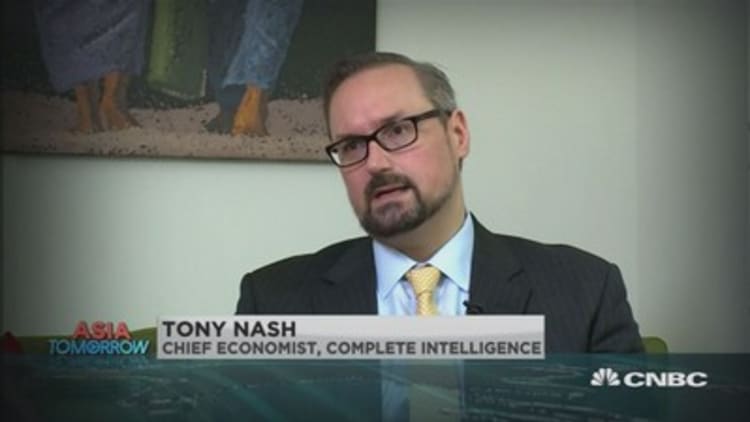On a sweltering Delhi morning, the 30,000 square foot warehouse of Big Basket, an Indian online grocery store, is a hive of activity. Workers with hand-held computers read incoming orders for packaged foods, personal care products, cleaning supplies, and fresh produce, then pack the items into red delivery crates.
Each order is divided into several parts and assigned to multiple "pickers", who grab and pack stock from the aisles — such as personal care or products or packaged foods — that they know intimately. Big Basket found this was much more efficient than having a single "picker" collect all items for an individual order from separate parts of the warehouse.
"Every five or 10 minutes are calculated," says Sanjeev Khanna, who heads the company's operations in India's national capital region.
So far, these calculations seem to be paying off. With operations in six of India's biggest cities — and starting in two more in the coming months — Big Basket is the biggest player in India's most promising yet challenging ecommerce category: grocery retailing.

Globally, buying groceries online has not boomed, except in the UK. But in India, most consumers are still at the mercy of small mom-and-pop shops with limited or erratic supplies, while corporate grocery retailing has been stunted by expensive real estate and restrictions on foreign direct investment.
Chief executive Hari Menon, who co-founded Big Basket in 2011, believes that the promise of a greater choice of products, and convenience, will drive a faster pick-up of online grocery shopping in India than has been seen in other markets.
"Potentially, this business itself can be close to a $20 billion business in 2020," Mr. Menon says. "Organized retail is only 15 percent of overall retail here. Rental costs are really high, and that is really impacting business. The whole model looks very suspect. Online companies will go after these modern trade customers, who are mostly likely to shift."
Big Basket has raised $61 million from private equity funds Ascent Capital, Helion Ventures, Zodius and U.S.-based Bessemer Venture Partners and is valued at about $275 million. It says it has an estimated 500,000 active customers and that revenues are growing by 12 to 16 percent each month.
More from The Financial Times:
India set to change listing rules for start-ups
China ecommerce: JD.com eats into Alibaba's dominance
Supermarket price war moves upmarket
After collecting revenues of $33 million last year — when it was present in just five cities — it is projecting income of $126 million in the financial year to March 2016 and $295 million the following year.
Others also sense opportunity. Competition to entice Indian consumers to shop for groceries online is heating up, albeit with different business models. Many of the fledgling players in the space are effectively localized, on-demand delivery services, which develop relationships to source goods from existing brick-and-mortar corporate retailers such Metro Cash & Carry, the German wholesaler; HyperCity, a chain owned by India's Raheja, and More Stores, part of the Aditya Birla's retail operations.
Localbanya, which started operations in Mumbai three years ago, operates in five cities, as does Zopnow, based in Bangalore. Investors such as Sequoia Capital, Saif Capital, and Tiger Capital are also backing other young on-demand grocery delivery services such as Pepper Tap and Grofers These use mobile phone apps to link consumers to local stores, including independent mom-and-pop shops, and handle deliveries for online orders.
In recent years, Indian consumers have grown increasingly comfortable with shopping online, snapping up books, electronics and other non-perishables from India's three large marketplaces — Flipkart, Snapdeal and Amazon — with a clutch of smaller and specialized rivals, such as PayTM, also battling for market supremacy.
But with nearly 67 percent of Indian retail spending still going towards food and groceries, analysts and investors see a huge potential for companies that can cater to urban dwellers who are short on time, and want a greater choice of products than typically available at mom-and-pop stores, traditionally known as kiranas.
Read MoreHow e-commerce helps US small businesses go global
"Kiranas might be everywhere but will they have some Italian herbs, sundried tomatoes, or extra virgin olive oil that a premium category consumer might want?" says Pragya Singh, a vice-president with Technopak, a New Delhi-based retail consultancy. "If you can offer urban Indian consumers the products they might not have access to, you can actually make a customer very loyal.
But if potential rewards are high, so are the challenges. Online groceries require complex logistics, including local supply chains that must be developed city-by-city, with a reliable system that ensures rapid deliveries within precise time windows.
"Customers for groceries have a much quicker fulfillment need than in other categories," says Ms. Singh. "I want it the same day or the next day. I don't want my potatoes coming three days later."
Big Basket, India's only egrocery developing its own integrated back-end supply chain from scratch, believes the battle for customer loyalty — and market share — can be won through the reliable supply of high-quality fruit and vegetables to finicky customers, short on time to pick over produce themselves.
Says Mr. Khanna: "If you can give customers confidence in your fruit and vegetables, that is your winning edge".

